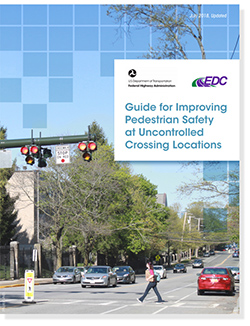October 17, 2019
Innovation of the Month:
Safe Transportation for Every Pedestrian
Last week, we discussed the importance of looking at pedestrian crossings and roads system wide to begin the journey toward Safe Transportation for Every Pedestrian (STEP). Now, it's time for your agency to look at the tools, or countermeasures, to best increase pedestrian safety at a given location. FHWA has several resources to help your agency determine the best fit for your pedestrian safety needs.
FHWA's Guide for Improving Pedestrian Safety at Uncontrolled Crossing Locations details a six-step process to help agencies select countermeasures for uncontrolled crossing locations based on research and best practices.

The Pedestrian Safety Guide and Countermeasure Selection System (PEDSAFE) Countermeasure Selection Tool responds to user input and returns a list of STEP countermeasures suitable to the roadway conditions. For each countermeasure, PEDSAFE provides users details about typical costs, design considerations, and installation examples.
The STEP Countermeasure Tech Sheets describe countermeasures for uncontrolled crossing locations and provide detailed information on cost and crash reduction factors. A set of STEP Countermeasure Videos is also available to explain the overall purpose and design elements for several of these countermeasures. These materials emphasize the life-saving impact of the STEP countermeasures to state and local transportation agencies.
States are already using these resources to develop and implement plans of their own across the country.
Pedestrian fatalities continue to rise across the nation and in Arizona. To combat the increase, the Arizona Department of Transportation (ADOT) formed a multi-agency team including ADOT, FHWA, the City of Phoenix, City of Tempe, and City of Tucson to advance implementation of STEP countermeasures. The STEP team referenced the Statewide Pedestrian Safety Action Plan (2017) to help identify locations for focused improvements. The team also identified the different challenges that rural and urban areas face with implementing the STEP countermeasures and designed resources to help local agencies advance STEP on locally owned road systems.
The team developed an AZ STEP Guide website devoted to their program, including an interactive countermeasure selection tool based on FHWA guidelines. The website provides links to Arizona-specific installation examples, illustrations of the countermeasures, and references to State laws and MUTCD guidance for the design of the treatments.
To learn more about the STEPs you can take to choose and implement countermeasures, please contact Becky Crowe with the FHWA Office of Safety or Peter Eun with the FHWA Resource Center.
Private Contributions Help Complete Public Transportation Project in Georgia
Don't shelve that project—get it funded! Private contributions, a value capture strategy that includes equity, property, or in-kind services, can help transportation agencies close funding gaps while providing the private partner with increased business or development opportunities facilitated by enhanced mobility or accessibility.
In Atlanta, Georgia, the ambitious Atlantic Station project—a mixed-use cluster of residential, retail, commercial, and open spaces built on a remediated brownfield site—hinged on the construction of the 17th Street Bridge. To make it happen, a private development group provided $15.2 million toward the $76 million project.
Spanning 14 lanes of interstate highway, the bridge provides essential accessibility between the redevelopment site and Atlanta's Midtown area, including direct pedestrian access to the rapid transit rail station. The facility includes dedicated bike and transit lanes, covered sidewalks, and a landscaped pedestrian park and thoroughfare.
Private contributions were pivotal in converting an unused, blighted brownfield site into a vibrant development, enhancing the attractiveness of downtown Atlanta, increasing economic activity, and improving multimodal accessibility in the area.
To find out how value capture can help your agency move forward, contact Stefan Natzke, FHWA Office of Planning, Environment, and Realty, or Thay Bishop, FHWA Center for Innovative Finance Support.
New Jersey, Pennsylvania, and Washington Win STIC Excellence Awards
State Transportation Innovation Councils (STIC) in New Jersey, Pennsylvania, and Washington received 2019 STIC Excellence Awards for demonstrating success in fostering a strong culture of innovation. The American Association of State Highway and Transportation Officials (AASHTO) and Federal Highway Administration collaborate on the annual award, which was presented to the winning STICs at AASHTO's annual meeting in St. Louis, MO.
New Jersey
The New Jersey STIC is developing a culture of innovation with broad stakeholder participation, shared metrics, and an engaged leadership. The STIC established processes to identify and move new technologies into practice, including an online portal to solicit potential ideas. The STIC also created three teams—Infrastructure Preservation, Safety, and Mobility and Operations—to champion innovations. A new web page features information on the STIC's innovation initiatives and a searchable innovation database.
Pennsylvania
The Pennsylvania STIC fosters an innovative culture at all levels of government and throughout the private and nonprofit sectors to ensure smart investments in Pennsylvania's highway infrastructure. The STIC consolidated its Technical Advisory Groups from 10 to four—Design, Construction and Materials, Maintenance, and Safety and Traffic Operations—to improve efficiency, enhance collaboration between groups on overlapping innovations, and provide flexibility to engage a variety of subject matter experts. The STIC also revamped its website, which features innovation deployment information and an interactive Year-End Report.
Washington
The Washington STIC is building a culture of innovation through collaboration to update the Washington State Department of Transportation Hydraulics Manual and to develop a programmatic biological assessment with the U.S. Fish and Wildlife Service. These efforts brought local, Federal, and private sector partners to the table to look at how to institutionalize innovations statewide.
For more information on the STIC Excellence Awards, contact Sara Lowry of the FHWA Center for Accelerating Innovation.
About EDC
Every Day Counts, a State-based program of the Federal Highway Administration’s Center for Accelerating Innovation, works with State, local, and private sector partners to encourage the adoption of proven technologies and innovations to shorten and enhance project delivery.


